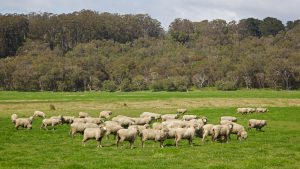
A flock of sheep grazing near Albany in Western Australia.
A Federal Government support mechanism helping keep WA agribusiness exporters defend their markets has been extended until at least February next year.
The International Freight Assistance Mechanism, which has kept international freight routes open for Australian producers, has been allocated $350 million of government funding.
It has seen 129,000 tonnes of fresh produce exported to 65 countries from Australia, including 22,000 tonnes from WA – mainly to Singapore, Hong Kong, China and the Middle East since April.
The assistance was initially intended to run until August, then until December, but has recently been extended until February.

Michael Byrne advises the government on operational aspects of the air freight support.
Michael Byrne, International Freight Coordinator-General, says the main aim of the assistance package was to help businesses offset exorbitant air freight costs resulting from Coronavirus travel restrictions.
“In January this year there were 9000 outbound flights out of Australia internationally and at the moment there’s about 1700, so tonnage capability is down by 40 per cent,” he explains.
WA producers have sent about 5500 tonnes of lamb, 2500 tonnes of pork, 1600 tonnes of mixed leaf vegetables, 9500 tonnes of other fruit and vegetables, 1180 tonnes of crayfish, 600 tonnes of seafood and 570 tonnes of beef out of the country.
Qantas, Virgin, Qatar Airways, Cathay Pacific, Singapore Airlines and Japan Airlines planes have been used to transport these goods out of the country and have also brought back essential supplies such as face masks and medicines.
Byrne says air freight costs when the mechanism was first introduced in April were between 3.8 and 13 times higher than what they were normally, and now they are between double and seven times as much.
“They’ve come down materially from April, May and June, but they are nowhere near pre-COVID levels and they won’t be for years. Until passengers start flying in big numbers, air freight prices can’t come down,” he says.
International Air Transport Association forecasts indicate that international passenger numbers will not reach pre-COVID levels until 2024 and freight rates are not expected to return to pre-pandemic levels until 2022.






